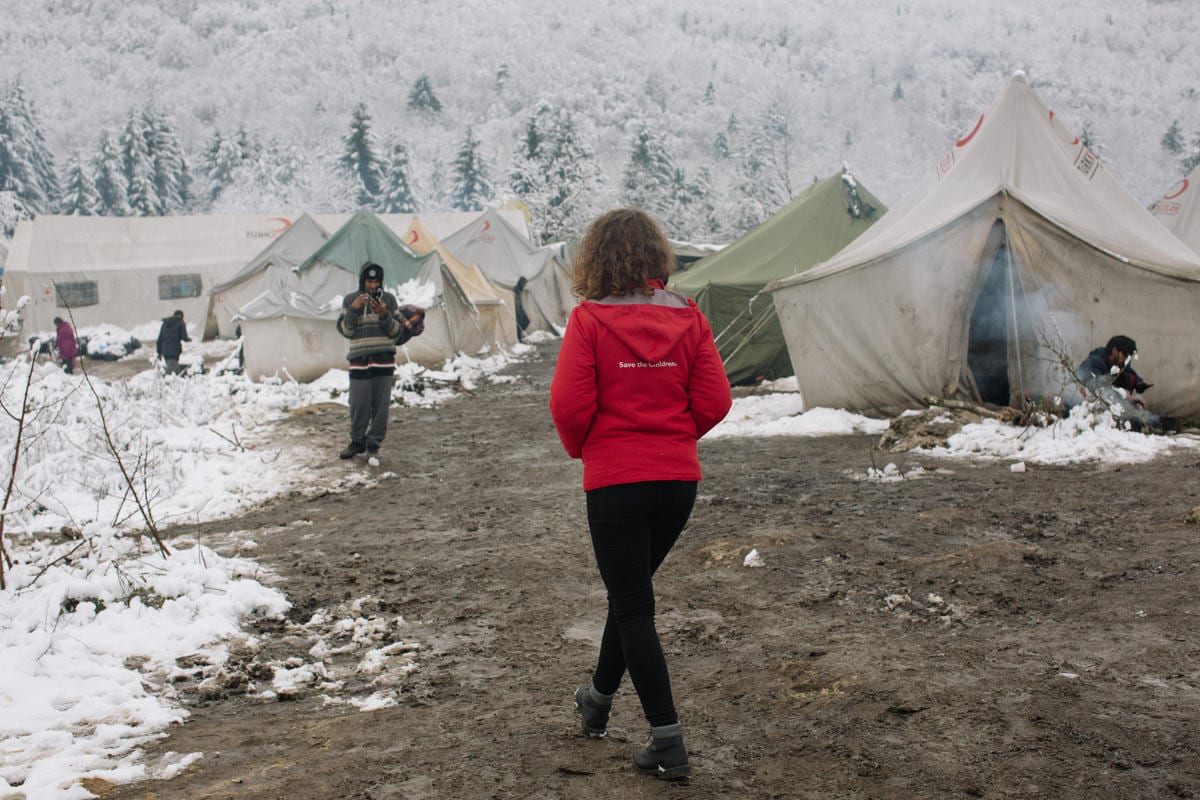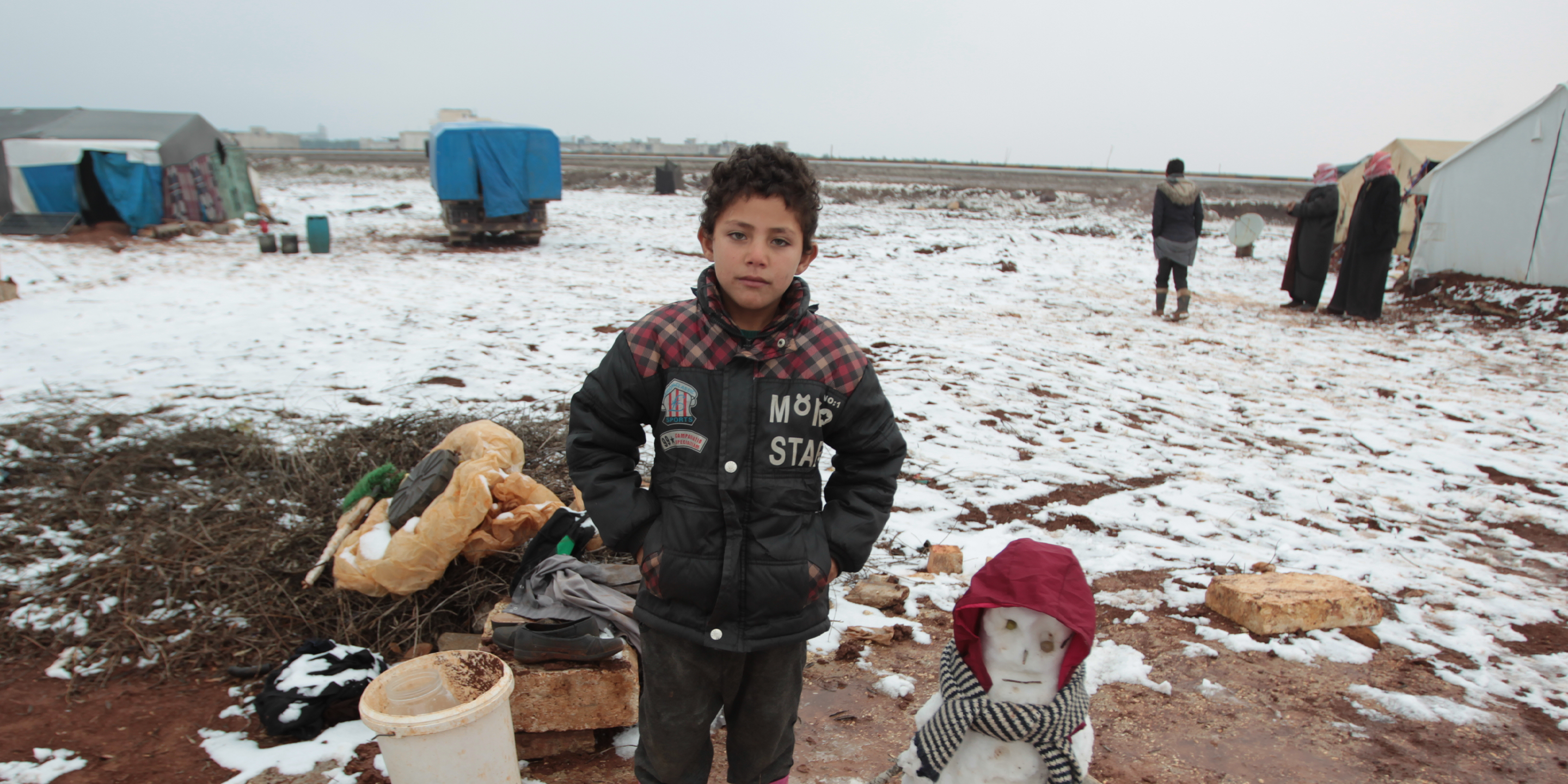Sleeping in the open Despite sub-zero temperatures, children in Bosnia and Herzegovina are forced to sleep outside, in occupied houses or empty buildings.
A fluctuating number of around 50 migrant children are sleeping rough in Bosnia and Herzegovina without any support and protection, putting their health and wellbeing at risk, warns Save the Children. They are staying outside in the freezing cold or in squats, empty buildings and in private residences without supervision of an adult.
 Picture from last year: In the refugee camps in Bosnia and Herzegovina, children and their families face freezing temperatures and snow, here near the town of Bihac.
Picture from last year: In the refugee camps in Bosnia and Herzegovina, children and their families face freezing temperatures and snow, here near the town of Bihac.
Registration as a problem In Bosnia and Herzegovina, there are only a few official places of refuge where people can register. Without registration, children are invisible and have no access to protection, health facilities or food and water.
Help on site We have been working in Bosnia and Herzegovina for more than 20 years and in the current situation we have already helped hundreds of children in child-friendly spaces, providing them with a warm and safe place. We also distribute much needed warm blankets, sleeping bags, winter clothes and shoes.
The children travelling alone are among the estimated 2500 people scattered around the country without proper accommodation. As temperatures have fallen below zero during the nights and COVID-19 infections continue to rise, children are spending their days and nights outside, with limited access to food, water, sanitation and no access to protection, health, asylum or education services. The children sleeping outside are in urgent need of a safe and warm place to stay and of access to protection services, Save the Children said. Children who are not staying in official shelters are sheltering in abandoned buildings and makeshift camps, exposed to harsh weather, health risks, abuse and violence.
“I have been sleeping in squats for two months, eating food that I got from organisations or local people. It’s too cold to stay in buildings like this. We make fires but then you can’t breathe because of the smoke,” a 17 year-old told Save the Children in the city of Bihać.
Registration as a problem
According to officials, there are around 500 unaccompanied children in various shelters in the country, along with some 450 children with their families. After the closure of two large camps last year, the number of shelters for refugees and migrants in Bosnia & Herzegovina has drastically decreased. Refugees and migrants, including children, can only be registered if they are about to access official shelters. Without registration, unaccompanied children don’t have access to a legal guardian and remain invisible to the protection system, Save the Children said.
Many unaccompanied children are reluctant to leave the Una-Sana Canton region for shelters in other areas, as they want to stay close to the border with the EU and don’t want to leave the groups they are travelling with. The lack of a functioning referral system for children to get into suitable accommodation is forcing them to fend for themselves outside. Save the Children is calling for the registration and protection of migrant children living on the streets in Bosnia & Herzegovina. As it is on the route to Western European border areas, the region has become a hotspot for migrants. Because of their desperate situation, a lack of legal pathways and solutions for children and families, they continue to attempt to cross the Croatian border into the EU, despite reports of violent push backs. Save the Children’s teams in Bosnia & Herzegovina have witnessed the deep impact of this stressful situation on children, particularly among those travelling alone, including some of them resorting to self-harm.
Children should not be living through winter without a roof over their head. They shouldn’t risk their lives and health by drinking water from rivers, freezing in low temperatures, or building fires from trash to keep warm. It is vital that access to protection, health and other key services are ensured. It’s their human right but also, in the light of the COVID-19 epidemic, it’s also a public health issue.
Zeravcic: “We need additional shelters urgently before children start freezing to death or are otherwise harmed. In particular, unaccompanied children need to be kept safe, but also families and other vulnerable groups. That means that additional shelters, adequate for children and families, need to available throughout the country and along the migration route.
“The authorities must ensure immediate official registration, referral and accommodation for all children, including unaccompanied children. Registration is an essential first step in providing protection to the most vulnerable and it cannot depend on available reception capacities. All children, including those without their caregivers, have the right to be safe, and be protected.”
All children have the right to be safe, and be protected.
Help now
